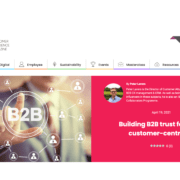Entrepreneurialism in B2B sales
Fostering Entrepreneurialism in B2B Sales and Account Management
How can large B2B organisations foster greater entrepreneurialism within their sales and account management teams? Alan Thompson and Peter Lavers reflect on our latest B2B Senior Leaders Roundtable.
At Customer Attuned, we believe that there’s immense value in discussing big questions like this in small, honest conversations among senior leaders from diverse B2B sectors. In our most recent roundtable, held in April, we explored how to build and nurture an entrepreneurial mindset in corporate environments.
Beyond Start-Ups: What Does Entrepreneurialism In B2B Really Mean?
While the term is commonly associated with start-ups, entrepreneurialism is just as valuable—and arguably harder to cultivate—in large, established organisations. In sales and account management, it’s about instilling a “my business” mindset: treating a client book like your own business and constantly seeking ways to grow value through stronger, more strategic relationships.
Entrepreneurial thinking means:
- Seeing opportunity where others see routine
- Taking calculated risks to drive growth
- Persisting through challenges
- Thinking creatively to deliver client and commercial value
With this in mind, Alan Thompson led a lively discussion on the subject, which is summarised here. Many thanks to our participants for the open and honest debate.
Culture trumps Strategy
One of the clearest insights from our discussion was that entrepreneurialism lives or dies by culture. You can’t bolt on innovation if the broader environment doesn’t support it. That means leadership must shift away from control-based management towards enabling and empowering teams. Leaders need to build platforms that encourage experimentation—within appropriate boundaries—and eliminate fear of failure.
This also means confronting and dismantling blame culture. True entrepreneurial environments thrive on fast learning, iterative progress and even the occasional failure. In short, success comes from creating safe spaces to take smart risks.
Are You Targeting the Right Outcomes?
Another key issue is how success is measured. Many B2B businesses still base performance metrics and segmentation on revenue, rather than profit or long-term value. This can inadvertently stifle entrepreneurial behaviour, promoting short-term wins at the expense of trust, innovation and sustainable growth.
If entrepreneurialism is the goal, then targets must reflect that. Empowered, long-term thinking comes from aligning incentives with customer outcomes, value creation, and profitability—not just top-line sales.
Hire for the Mindset
Lastly, we discussed the importance of hiring people with natural entrepreneurial qualities. While skills can be taught, the curiosity, drive, and adaptability that underpin entrepreneurialism are often innate. If businesses want to build a more entrepreneurial culture, it starts by recruiting individuals who already think and act in those ways—and then giving them room to thrive.
Join the Conversation
We’re passionate about helping B2B businesses unlock more value through trust, innovation, and capability. If you’re interested in future roundtables or want to explore how to cultivate entrepreneurial thinking in your teams, we’d love to hear from you.
Get in touch to be part of the next discussion—and start shaping the future of B2B sales and account management today.
You may also like:
Great Insights Shared by Cross-Sector Business Leaders
- Entrepreneurialism in B2B sales - May 7, 2025
- When is a B2B Customer/Supplier Relationship a “Partnership”? - May 1, 2024
- The Customer Attuned “Infinity Loop” of Customer Centricity Explained - December 8, 2023






